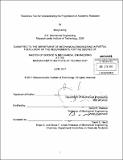| dc.contributor.advisor | David R. Wallace. | en_US |
| dc.contributor.author | Leong, Ming | en_US |
| dc.contributor.other | Massachusetts Institute of Technology. Dept. of Mechanical Engineering. | en_US |
| dc.date.accessioned | 2011-12-09T21:35:17Z | |
| dc.date.available | 2011-12-09T21:35:17Z | |
| dc.date.copyright | 2011 | en_US |
| dc.date.issued | 2011 | en_US |
| dc.identifier.uri | http://hdl.handle.net/1721.1/67624 | |
| dc.description | Thesis (S.M.)--Massachusetts Institute of Technology, Dept. of Mechanical Engineering, 2011. | en_US |
| dc.description | Cataloged from PDF version of thesis. | en_US |
| dc.description | Includes bibliographical references (p. 29-31). | en_US |
| dc.description.abstract | The importance of process in successful and effective technology and product development is widely recognized in industry. Tools, such as Technology Readiness Levels (TRLs) and various metrics, have been developed and successfully used to guide and strategically plan R&D processes, allocate resources, and calibrate expectations. Similarly, one might hypothesize that academic research might also benefit from similar tools that would assist both researchers and funding organizations. A research assessment tool should: 1) facilitate planning and communication; 2) effectively gauge progress; and 3) accommodate and capture the diverse scope of academic research. However, the inherent open-endedness and exploratory nature of research makes it difficult to quantify or characterize research progress. This work aims to develop an academic research measurement process, embodied as a tool called Research Maturity Levels (RMLs), that divides research activities into four main components: 1) background knowledge, 2) problem and question formulation, 3) procedures and results, and 4) resources. Within each component, the RML guides researchers through a process of increasing maturity levels. Additionally, each component includes mechanisms to formalize iterations and "eureka" moments-when directions and plans may change based upon a new knowledge. Preliminary evaluation suggests that the tool has promise as a comprehensive measurement tool. It is hoped that this work will result in a tool that can facilitate planning, help to measure and communicate research progress, and encompass the diverse scope of academic research goals. | en_US |
| dc.description.statementofresponsibility | by Ming Leong. | en_US |
| dc.format.extent | 49 p. | en_US |
| dc.language.iso | eng | en_US |
| dc.publisher | Massachusetts Institute of Technology | en_US |
| dc.rights | M.I.T. theses are protected by
copyright. They may be viewed from this source for any purpose, but
reproduction or distribution in any format is prohibited without written
permission. See provided URL for inquiries about permission. | en_US |
| dc.rights.uri | http://dspace.mit.edu/handle/1721.1/7582 | en_US |
| dc.subject | Mechanical Engineering. | en_US |
| dc.title | Towards a Tool for Characterizing the Progression of Academic Research | en_US |
| dc.type | Thesis | en_US |
| dc.description.degree | S.M. | en_US |
| dc.contributor.department | Massachusetts Institute of Technology. Department of Mechanical Engineering | |
| dc.identifier.oclc | 765964029 | en_US |
